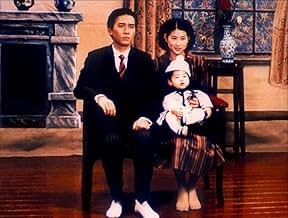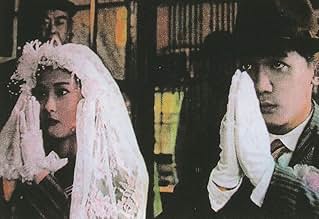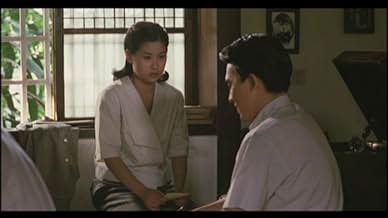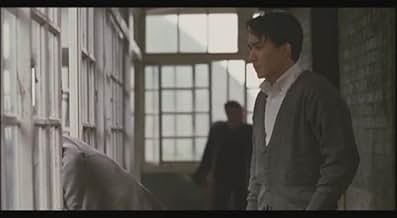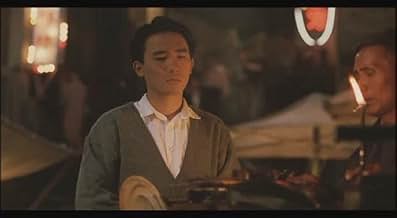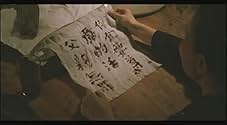VALUTAZIONE IMDb
7,8/10
6580
LA TUA VALUTAZIONE
Finita la guerra e cacciati i giapponesi, l'isola di Taiwan viene riconquistata dal governo nazionalista e anticomunista di Chan Kai-shek. Il periodo 1945-49 è raccontato attraverso le dolor... Leggi tuttoFinita la guerra e cacciati i giapponesi, l'isola di Taiwan viene riconquistata dal governo nazionalista e anticomunista di Chan Kai-shek. Il periodo 1945-49 è raccontato attraverso le dolorose vicende di quattro fratelli.Finita la guerra e cacciati i giapponesi, l'isola di Taiwan viene riconquistata dal governo nazionalista e anticomunista di Chan Kai-shek. Il periodo 1945-49 è raccontato attraverso le dolorose vicende di quattro fratelli.
- Regia
- Sceneggiatura
- Star
- Premi
- 8 vittorie e 6 candidature totali
Tony Leung Chiu-wai
- Wen-ching
- (as Tony Chiu Wai Leung)
Tien-Lu Li
- Ah-lu
- (as Tian-Lu Li)
Recensioni in evidenza
Hou Hsiou-Hsien's "A City of Sadness" is one of Oriental Cinema's most rewarding challenges. I have returned to it several times, always with a sense of awe, understanding it a little more on each occasion but still not always sure what is actually happening on the screen. Although this makes the experience sometimes frustrating, the miracle is that it never detracts from the gut feeling I have had from the very first viewing that I am watching a masterpiece. An ambitious attempt to capture the immediate post second world war period of Taiwanese history by following the members of one family through fragments of their daily lives rather than a carefully constructed continuous narrative, Hou's work resonates with tremendous feeling. As is usual with this director, the audience has to work hard to supply connections in a film without joins, in order to understand who is who and what is actually going on. I have to admit that some of the scenes of gang violence still elude me, but, these apart, the light is beginning to shine through. It is clear that the old man with the beret who sits often staring vacantly is the owner of that densely furnished restaurant; that he has four sons. The eldest, the sturdy looking one, seems perennially mixed up with figures of a gangster underworld, the second has returned from the war mentally damaged, the third did not return from active service in the Phillipines and is presumed dead. And then there is the youngest who has a photographer's studio and seems completely apart from the rest of the family by virtue of a sensitive, gentle nature and the disability of complete deafness brought on by a childhood accident. It is his fortunes and those of the young nurse he eventually marries that provide the sense of audience empathy that even the most obscure cinema need in order to work its magic. Their scenes provide moments of great tenderness in a relationship that relies entirely for communication on the written note such as the occasion when she needs to tell him about the beauty of a German folksong that is being played. When the country is placed under repressive martial law with massed executions for dissenters we have snippets of the deaf mute's experiences. There is a particularly telling moment when he is in captivity, unable to hear the sound of the firing squad from which he somehow mercifully escapes. In "A City of Sadness" it is short scenes such as this that one remembers so vividly. That it provides the experience of a sweeping epic without recourse to any great scenes of action is both its mystery and fascination.
This is the only one of Hou Hsiao-hsien's films I caught at a retrospective of his work, and it's a tragedy because this film is so incredibly good. Hou's rigorous formal approach (highly geometrical framing, repetitive shots along axes, distinctive use of lived-in colors) provides a framework for the film to operate within its own world. Whereas Coppola's "Godfather" goes this way and that, without a significant coherence, visually or rhythmically, "City of Sadness" feels like an elegy to Taiwan and the family (in much the same way that "Underground" is an ode to what was once Yugoslavia). At times funny, sorrowful, and invigorating, I suppose that what makes this film so special is that it refuses to operate in "big moments" and focuses, like Ozu (who Hou is often compared to) on the little events that make life what it really is.
This is definitely one of my all-time favorite movies. Before watching A City of Sadness, I subconsciously had this notion that somehow there were certain ways (or methods) feature narrative films should be made. Oh
how wrong I was. Experiencing this movie was like
the first time I saw Asian art, no more like the first time I tasted Chinese food as a kid. It was more than different. It was delightful! This film totally enlightened me! This poetic masterpiece changed the way I view cinema. This film which deals with modernity of Taiwan, feels more like a Confucian ritual, an ancestral rite of some sort. And at the same time like many of Hou Hsiao-hsien's other films, this movie deals with the theme of 'growth'. Hou seems to tell us over and over again that growth is learning to say goodbye to the things we love. One beautiful movie. I strongly recommend it to the cinephiles who haven't yet tasted this great cinematic treat.
Artistically, its greatness is not in dispute, but it is hard to overstate the importance of this film in political and social terms for Taiwan. The subject of the film, the February 28 Incident (the massacre of 20000 or more Taiwanese by Chinese Nationalist troops in 1947) had been completely been banned from public discussion by the now-defunct military government of Taiwan up until 1988 - only a year and a half before the film was released. To intervene so powerfully in a period of political and social change as Taiwan's democratic revolution in the late 1980s, makes the film as dramatic a re-configuring of a country's cultural landscape as any film has ever achieved.
10kmevy
This film is definitely one of the best historical film i have ever seen!
... putting aside all those clichés most filmmakers are tend to use: there is no such thing as heroic portrayal of martyrs or the use of extremely artificial dramatic art. That makes this film believable and, compared to others, very unique.
Normally you would have a narrator who is telling you the story from his point of view. Now, i don't want to say that i dismiss this way of narration but "A city of sadness" does not need such a narrator; in fact it would shatter the special specific atmosphere of this movie if that would be the case. Without definitive narrative elements, the staging normally involves (narration/music/DP etc), the viewer gets the feeling that he is able to see for himself what the lives of those people were like when WWII ended. It is fascinating to witness how this very sober staging is still able to evoke strong emotions within the viewer. This is due to the directors vision but also to the cast which did an amazing job.
It was also very clever to have the deaf Wen-Ch'ing as the main character so the viewer can sympathize with him very easily: like Wen-Ch'ing the viewer is kind of caught up within the political turbulence and is not to able react like he would want because he is mute ... and is therefore not able to speak up in a loud voice to stop the violence. He is forced to watch.
Even today the topic Taiwan/China isn't solved at all. After watching this film people will surely get a better understanding why the struggle between China and Taiwan is so filled with anger, sadness, fury ...
so ... that's definitely a must-see!! ;)
... putting aside all those clichés most filmmakers are tend to use: there is no such thing as heroic portrayal of martyrs or the use of extremely artificial dramatic art. That makes this film believable and, compared to others, very unique.
Normally you would have a narrator who is telling you the story from his point of view. Now, i don't want to say that i dismiss this way of narration but "A city of sadness" does not need such a narrator; in fact it would shatter the special specific atmosphere of this movie if that would be the case. Without definitive narrative elements, the staging normally involves (narration/music/DP etc), the viewer gets the feeling that he is able to see for himself what the lives of those people were like when WWII ended. It is fascinating to witness how this very sober staging is still able to evoke strong emotions within the viewer. This is due to the directors vision but also to the cast which did an amazing job.
It was also very clever to have the deaf Wen-Ch'ing as the main character so the viewer can sympathize with him very easily: like Wen-Ch'ing the viewer is kind of caught up within the political turbulence and is not to able react like he would want because he is mute ... and is therefore not able to speak up in a loud voice to stop the violence. He is forced to watch.
Even today the topic Taiwan/China isn't solved at all. After watching this film people will surely get a better understanding why the struggle between China and Taiwan is so filled with anger, sadness, fury ...
so ... that's definitely a must-see!! ;)
Lo sapevi?
- QuizIn 1989, Hou Hsiao-hsien's A City of Sadness, the first film to touch on the 228 Incident, a taboo subject in Taiwan, became a big hit in the theaters. As a result Jioufen, where the film was set, revived due to the film's popularity. The nostalgic scenery of Jioufen as seen in the film, as well as appearances in other media, charmed many people into visiting Jioufen. For the beginning of the 90s, Jioufen experienced a tourist boom that has shaped the town as a tourist attraction. Soon retro-Chinese style cafés, tea houses, and souvenir stores bearing the name "City of Sadness" were built.
- ConnessioniFeatured in When Cinema Reflects the Times: Hou Hsiao-Hsien and Edward Yang (1993)
I più visti
Accedi per valutare e creare un elenco di titoli salvati per ottenere consigli personalizzati
- How long is A City of Sadness?Powered by Alexa
Dettagli
Botteghino
- Lordo in tutto il mondo
- 143.169 USD
Contribuisci a questa pagina
Suggerisci una modifica o aggiungi i contenuti mancanti


